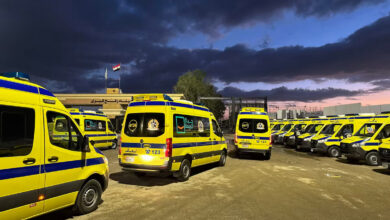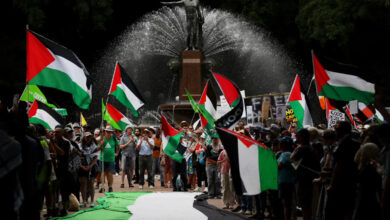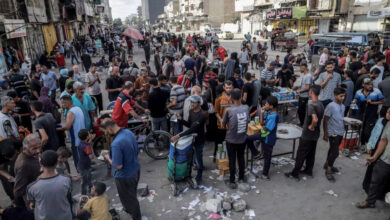Wikileaks, an organization which publishes secret documents, recently uploaded 3000 cables sent from the US Embassy in Cairo; they chart 26 years of Egyptian history, US interests and an unexpected revelation about former First Lady Suzanne Mubarak’s religious affiliation. The documents come as part of 251,287 US diplomatic cables released by the organization since November 2010.
Encroaching Iranian influence – real or perceived – is a recurring theme. A US Embassy under-secretary visited Egypt in May 2009 to “alert governments and banks about the threats presented by the Iranian banking system.”
Responding to a suggestion that the US freeze assets of Hezbollah leaders, former Foreign Minister Ahmed Aboul Gheit is quoted as saying that anything “dirtying the name of Hezbollah is welcome.”
While the cables reveal nothing new about US aid to Egypt, repeated references to US military funding are a reminder of recent attacks on local NGOs for their willingness to accept foreign funding. Some have perceived the attacks as an attempt to smear civil society groups.
Unsurprisingly, US Embassy cables obsess over Egypt’s border with Gaza. A March 2009 cable describes Field Marshall Mohamed al-Tantawy – then Defense Minister and currently head of the ruling Supreme Council of the Armed Forces – vetoing a satellite connection necessary for operating tunnel-detecting sensors on the border.
Tunnels under the Egypt-Gaza border are a lifeline to Gazans, whose access to the outside world is controlled by Israel and Egypt. The tunnels are used to smuggle commodities as well as arms into the strip, and Israel and the US have placed Egypt under heavy pressure to stop tunnel activity.
Egyptian discomfort with the extent of the government’s cooperation with the US is apparent in a cable dated from March 2009: “Tantawy claimed potential opposition to US control of the Egyptian border fueled his decision [to veto the satellite link].”
A cable dated August 2008 says the US Army Corps of Engineers surveyed the Gaza border in June of that year. It also assisted Egypt at “a training site in Giza to support [it] in deploying a US-supplied seismic-acoustic counter-tunneling system.”
In a September 2008 cable, Deputy Assistant Foreign Minister for Refugees Tarek al-Maaty elaborates on border policy with regards to migrant crossings into Israel
Maaty says that while border guards were instructed to provide a verbal warning, shoot in the air and then shoot people in the legs if they failed to halt, the policy changed because “Bedouin smugglers instruct the African migrants not to stop for the border guards, and assure the migrants that the Egyptian guards will not shoot them.”
“It is no longer feasible just to shoot in the air,” Maaty is quoted as saying.
Egypt has been repeatedly criticized by rights groups for its border policing policy and the repeated killing of migrants trying to reach Israel.
In a cable entitled “Tourism in the Sinai: The Haves and Have Nots,” the challenges facing the peninsula’s impoverished Bedouin community are described.
“Tourism is king in South Sinai,” the cable notes, but Bedouins have not been allowed to reap its rewards. It quotes a president of a local council in the city of Tor as saying that authorities’ insistence that armed guards accompany all eco-tourist groups has “effectively killed the industry.”
The omnipotence of the State Security Investigations Services (SSIS) under Mubarak is discussed in an August 2009 cable, which notes SSIS activity being directed by “personal animus” rather than discernible policies.
One activist, Engi al-Haddad, director of the Afro-Egyptian Human Rights Organization, described her repeated harassment at the hands of the SSIS as “personal and insulting and a form of mental terrorism.”
A surreal October 2008 cable describes one member of the US diplomatic corps’ musings – based entirely on chats in coffee shops – on Egyptian politics.
Entitled “The View from the Ahwa: The Talk of the Town in Cairo’s Myriad Cafes,” the cable appears to have been written by a failed or repressed writer of literature who takes his frustration out on colleagues in the form attempted lyricism that amounts to little more than hackneyed Orientalist claptrap.
The “passive” Egyptians smoking their water pipes gave “no indication that anyone had plans to do anything but complain,” the cable reads.
“We picked up no hint of revolutionary fervor, no hushed whispers expressing admiration for an opposition figure or advocating any political change, or calling for a resort to violence,” the writer grumbles, seemingly ignoring the possibility that any Egyptian who did harbor revolutionary thoughts in his breast might not share them with strangers from the US Embassy while attempting to enjoy a cup of tea.
Former President Hosni Mubarak’s health and mortality was the subject of many dinner party discussions during the regime’s latter years, and occupied cable authors too.
Under the heading “biographical note,” a July 2009 cable states that, “Mubarak was alert and talkative throughout the meeting, which lasted over an hour. He appeared to be in good health.”
The topic also perplexed the Chinese Foreign Ministry. In a November 2006 cable, Zhou Biao, West Asia and North African Department Deputy Division Director, says that meetings between Mubarak and Chinese leaders “went quite well because President Mubarak is one of China’s oldest friends and the last foreign dignitary that Chairman Mao received before his death.”
Zhou remarked, however, “that President Mubarak is getting on in years” and “wondered aloud what might happen in Egypt when it comes time for succession.”
Finally, one cable drops a bombshell about the former first lady that – if true – would be one of Egypt’s best-kept secrets.
“Suzanne Mubarak is Christian, while her husband is Muslim,” the cable states matter-of-factly. This might be news not only to Egyptians, but even to Suzanne Mubarak herself.




